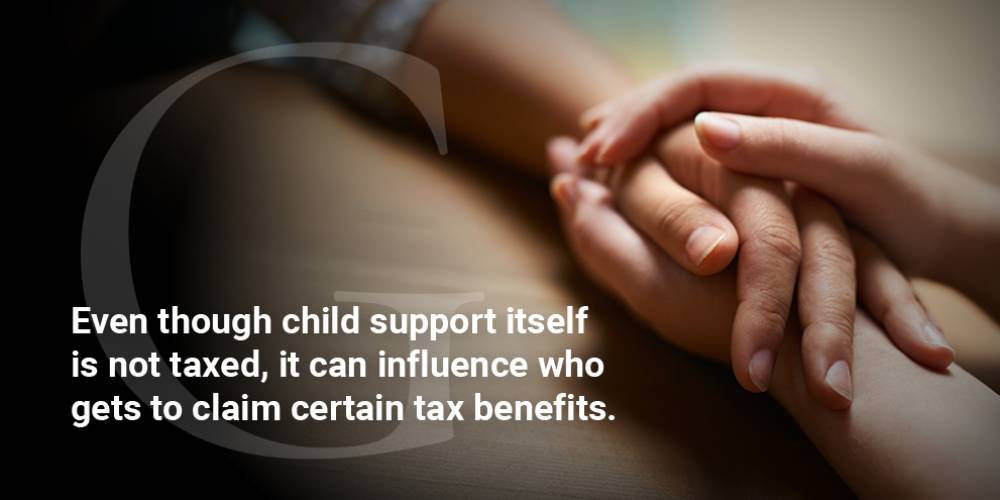Is Child Support Taxable or Tax Deductible?
 Divorce and legal separation create several financial questions, especially when adults have minor children. Parents not only need to work out their parenting time and decision-making arrangements, but also how they will handle the costs of raising a child once their marriage ends. Child support is an important tool for ensuring that children are cared for, but it often raises another question: How will it affect your taxes?
Divorce and legal separation create several financial questions, especially when adults have minor children. Parents not only need to work out their parenting time and decision-making arrangements, but also how they will handle the costs of raising a child once their marriage ends. Child support is an important tool for ensuring that children are cared for, but it often raises another question: How will it affect your taxes?
The short answer is thankfully straightforward: Child support is not taxable income for the parent receiving it, and it is not tax deductible for the parent paying it. But while the rule itself is simple, the reality of how child support interacts with taxes, income, and other financial factors can be more complicated.
At Goostree Law Group, our Wheaton child support attorneys bring decades of combined experience, including service as judges, appellate court attorneys, and in private practice, to help Illinois families understand the full financial impact of child support. We offer free consultations to discuss your case.
How the IRS Treats Child Support
The IRS does not consider child support to be income. That means the receiving parent does not report child support payments as income on a tax return. Likewise, the parent making payments cannot deduct child support from taxable income.
This rule prevents child support from being treated as a "tax advantage" for one side or a "tax penalty" for the other. Instead, it keeps the focus on the child’s needs. However, other related issues can affect your taxes, and these can cause confusion.
Is Spousal Maintenance Taxable?
Parents sometimes confuse child support with spousal maintenance (alimony). While they are different, they can both be addressed in the same divorce order. The tax implications of spousal maintenance depend on when your divorce was finalized. For divorces finalized before 2019, alimony payments are tax deductible for the payer and taxable income for the recipient. For divorces finalized (or modified) in 2019 or later, alimony is no longer deductible or taxable.
This distinction matters because families with older divorce judgments may be faced with the tax implications of both child support and alimony. A lawyer can help you determine how the rules apply to your situation.
Can Child Support Affect Tax Credits?
Even though child support itself is not taxed, it can influence who gets to claim certain tax benefits.
-
Child Tax Credit (CTC): Generally, the parent who has primary custody (this is not a legal term under Illinois law, but it means the child lives with them more than half the year) claims this credit. However, parents can agree in their divorce judgment to let the noncustodial parent claim the credit. Some parents alternate taking the credit every other year.
-
Earned Income Tax Credit (EITC): Only the custodial parent may claim this credit, and it cannot be transferred.
-
Dependent exemptions (pre-2018): These no longer apply under current tax law, but older agreements may still reference them.
These credits can be significant, sometimes worth thousands of dollars. That is why clear parenting time schedules and detailed divorce decrees are so important.
Can Child Support Orders Be Adjusted Because of Taxes?
Illinois law allows parents to request a modification of child support if there has been a substantial change in circumstances. Under 750 ILCS 5/505, child support is calculated using income shares guidelines, which focus on both parents’ incomes and the child’s needs. While tax law itself is not a direct reason to adjust support, changes in after-tax income — such as losing eligibility for a tax credit you relied on when your support was originally set — may help show hardship or a significant change in financial circumstances. A court may consider this when deciding whether to modify a support order.
For example, if you lose eligibility for a tax credit that you assumed you would receive when your support obligation was formalized, this could impact your ability to pay. A court may consider this as part of a modification request.
What If Child Support Payments Are Missed?
Unpaid child support, often called arrears, creates both legal and financial issues. While the IRS will not tax unpaid support as income, missed payments can still result in wage garnishment or bank levies. The government can intercept tax refunds to cover arrears, your credit score and financial stability could be affected, and, in serious cases, criminal charges can even be filed.
It is critical for both parents to understand the tax refund interception program. If you are owed support, the IRS may redirect the paying parent’s federal refund to you. If you are behind on payments, you may lose your refund automatically.
Can Parents Make Agreements About Taxes in Divorce?
Parents can customize their parenting plan to account for various tax considerations, but there are limits to this. Parents can agree on who claims certain tax credits and how to allocate exemptions if they are still relevant under older law. Courts in Illinois generally allow these agreements if they serve the child’s best interests.
However, parents cannot override federal law. For example, you cannot make child support payments deductible by simply labeling them as such in a settlement. Courts and the IRS will look at the nature of the payment, not just the wording of your agreement.

International and Out-of-State Considerations for Child Support Payments
Some families in DuPage County have cross-border concerns. If one parent lives or works abroad, or in another state with different tax laws, things can get more complicated. Federal tax rules apply across the U.S., but state tax credits and enforcement strategies may vary. In Illinois, courts use income shares guidelines to calculate child support. While those numbers are not tied directly to federal tax law, the interaction between state child support enforcement and federal tax benefits is important to understand.
Call a Wheaton, IL Child Support Attorney
If you have questions about how child support interacts with your taxes, there is no need to guess. The answer may be simple — child support is not taxable or deductible — but the consequences of misunderstanding the details can be serious.
Call the experienced attorneys at Goostree Law Group at 630-584-4800 today for a free consultation. Our skilled DuPage County family lawyers have decades of combined experience, and we are ready to help you protect both your children and your financial future.












